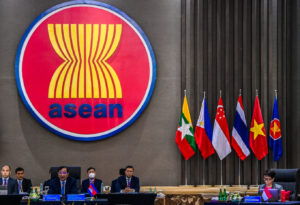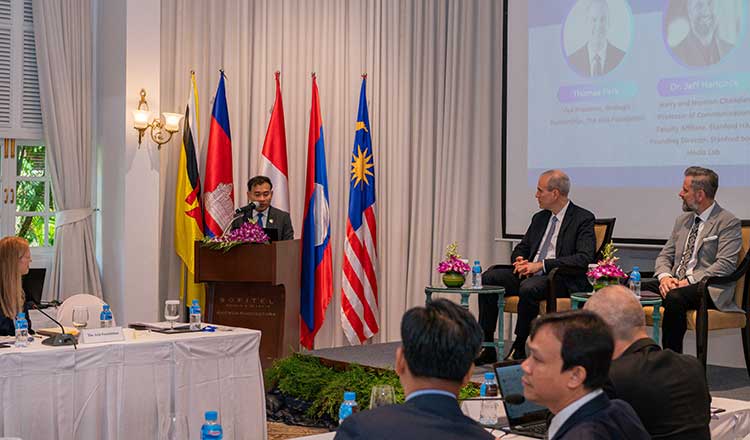ASEAN HEADLINE-AI | Cambodia hosts AI Adoption Side Event at ASEAN Meeting
Hul Seingheng, Chairman of the ASEAN Committee on Science, Technology, and Innovation, give his opening remarks at the 20th ASEAN Ministerial Meeting on Science, Technology and Innovation in Siem Reap City yesterday. MISTI ? Ben Sokean / Khmer Times
.
..

During a side event of the 20th ASEAN Ministerial Meeting on Science, Technology, and Innovation (AMMSTI-20), Cambodia’s Ministry of Industry, Science, Technology & Innovation (MISTI), in collaboration with ASEAN COSTI, The Asia Foundation, and Stanford’s AI Institute, hosted discussions on promoting inclusive AI integration within ASEAN.
Held on Monday, the event aimed to facilitate policy dialogues and foster collaboration to ensure that AI adoption prioritises human well-being and benefits all member states while addressing potential risks.
Chaired by Hul Seingheng, Undersecretary of State of MISTI and Chairman of the ASEAN Committee on Science, Technology, and Innovation, the event attracted around 160 participants, including representatives from ASEAN member states and ASEAN-US scientists and technologists.
…
“We need to agree on the importance of responsible development of AI by establishing robust ethical frameworks to address bias, upholding data privacy, ensuring fairness in AI algorithms, and investing in capacity-building initiatives,” said Seingheng.
“Fostering innovation and realising economic benefits for ASEAN requires proactive investments in AI research, technology transfer, and regional collaboration. This can be achieved by enhancing partnerships and embracing open science practices to encourage sharing new research findings,” he added.
To address the challenges of AI adoption, discussion focused on the vast potential of AI, emphasising the critical factors of fairness and trust, and examining the global landscape of AI governance.
Seingheng stressed the importance of a human-centred approach, collaboration, and ethical development to leverage AI for enhancing innovation, economic growth, and social well-being across the region.
“I urge everyone to remain committed to a shared vision of a responsible and inclusive AI future. By working together, ASEAN can leverage AI’s transformative power to create a prosperous, equitable, and sustainable region,” he said.
ASEAN has over 418 million internet users and a booming digital economy, said Satvinder Singh, Deputy Secretary-General for ASEAN, echoing views that AI is crucial for the region’s future.
Last year, leaders from ASEAN member states initiated the world’s first regional digital pact called the ASEAN Digital Economy Framework Agreement (DEFA). The agreement is crucial for the progress of ASEAN as it deals with new technologies such as AI and seeks to create regional processes for regulatory collaboration to foster transparency and accountability.
Singh also pointed out ASEAN’s work on AI governance and ethics, such as the ASEAN Guide on AI Governance and Ethics launched in February 2024, and the ASEAN Responsible AI Roadmap under the ASEAN-US 2024 Digital Work Plan priorities.
He highlighted the collaboration between ASEAN and The Asia Foundation, and their mutual effort to develop AI skills in the region.
Singh said UNESCO has recognised Cambodia as one of the world’s fastest adopters of innovative digital technologies.
He attributed the nation’s digital momentum to the strategic initiatives spearheaded by the Cambodian government, highlighting its proactive approach towards embracing digital innovations and policies.
“AI is both a technological and a social phenomenon. Public policy is essential to make sure AI serves everyone’s interests,” said Jeff Hancock, Harry and Norman Chandler Professor of Communication and Founding Director of the Stanford Social Media Lab.
Thomas Parks, Vice-president of Strategic Partnerships of The Asia Foundation, urged ASEAN to lead in AI adoption, given its benefits and risks for research and productivity.
He acknowledged the difficulties ASEAN faces, such as the lack of supercomputers and less R&D spending, but he also praised the region’s advantages, especially its youthful, connected population.
During the event, panel discussions brought together policymakers, scientists, and technologists from governmental bodies, UN agencies, universities, and research institutions to deliberate on the societal challenges posed by AI and advocate for increased collaboration.
Emphasising the importance of inter-governmental cooperation and empowering ASEAN member states, discussions underscored the need for national AI strategies and consideration of children’s interactions with AI technologies.
…
Cambodia is hosting the AMMSTI-20, the 85th Meeting on ASEAN Committee on Science, Technology and Innovation (COSTI-85) and related meetings from Monday through Friday this week in Siem Reap province.
The event aims to strengthen regional collaboration and advance the ASEAN Plan of Action on Science, Technology, and Innovation (APASTI) 2016-2025, and develop APASTI 2026-2035.
APASTI is a roadmap that aims to strengthen STI cooperation. It outlines key action areas: enhancing research and development capacities, promoting technology transfer and innovation, improving sci-tech education, and fostering partnerships with the private sector.
APASTI aims to harness STI to drive sustainable economic growth and development in the region.
.

@[email protected]



 Memento Maxima Digital Marketing
Memento Maxima Digital Marketing






